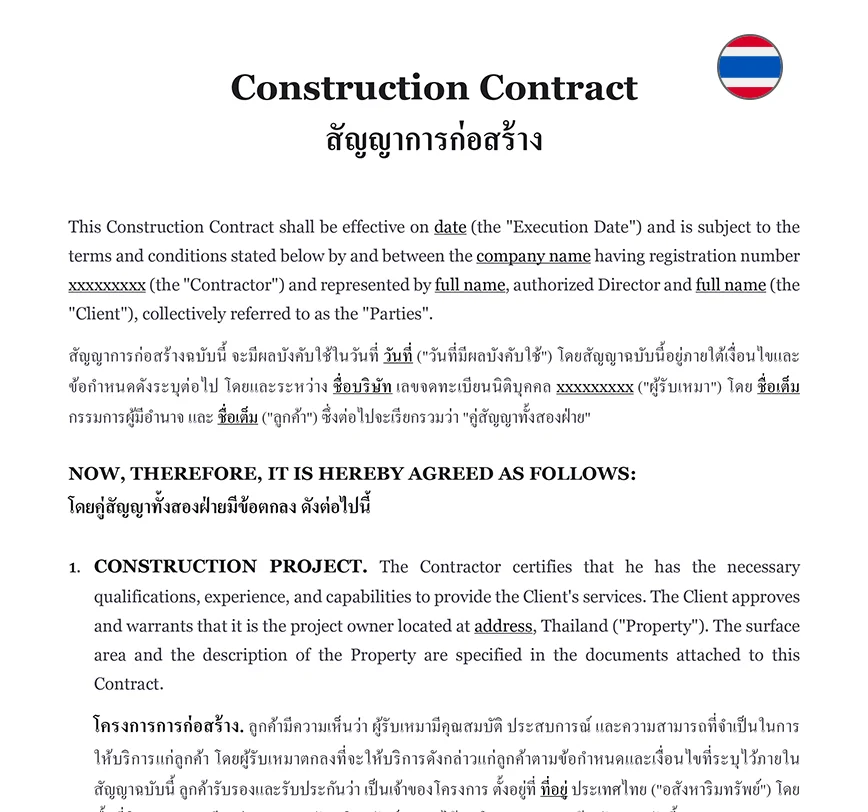Can building a house in Thailand: legal registration and permit process really take as little as three months? With stricter property rules for foreigners and updated compliance checks in 2025, understanding these processes has never been more essential.
Every step, from verifying land rights to passing final inspections, is regulated under evolving Thai law. Owners face new reporting duties and tax changes that can impact both investment value and ownership security.

Ready to build with confidence? Discover how a meticulous approach to registration, permits, and compliance can safeguard your investment and keep your project on track.
Key Takeaways
- Foreigners cannot own land outright but can use leaseholds, Thai-majority companies, spousal arrangements, or condos (max 49% per building).
- Verify Chanote deeds and conduct full due diligence before building.
- Check local zoning and environmental rules before construction.
- Prepare complete architectural and engineering plans signed by licensed Thai professionals.
- Obtain building permits; failure risks fines or demolition; approval typically takes ~20 days.
- Follow scheduled inspections to ensure compliance with safety, zoning, and environmental codes.
- Register completed homes with the Land Office within 15–30 days for legal recognition and utility access.
- Pay 2025 property taxes and fulfill reporting requirements to maintain legal ownership rights.
Looking to buy, sell, or lease property in Thailand?
Our team handles registration, title searches, purchase and lease agreements and all property rights.
Table of Contents
-
Land Ownership Laws for Foreigners in Thailand
-
Thai Zoning and Environmental Regulations
-
Submitting Architectural and Engineering Plans
-
Building Permit Application Process in Thailand
-
House Registration and Legal Duties in 2025
-
FAQ: Building a House in Thailand
-
Conclusion
Land Ownership Laws for Foreigners in Thailand
Legal Land Ownership Options for Foreigners
Foreigners cannot legally own land outright in Thailand, but several regulated options allow for secure property rights.
Legal structures include:
- Long-term leasehold (up to 30 years, often renewable)
- Ownership via a Thai-registered company (with majority Thai shareholders)
- Purchasing in the name of a Thai spouse (with signed consent and legal documentation)
- Condominium ownership: Foreigners can own units outright, but no more than 49% of the units in any building
Each structure carries unique benefits, requirements, and risks. For instance, a leasehold offers security for up to 30 years, while company structures face closer regulatory scrutiny in 2025.
For government guidance, see the Thailand Land Code.
Securing Land Rights Before Building
Before construction, confirming the legal right to use land is essential and must follow a formal process.
Key steps include:
- Verifying the Chanote (title deed) or long-term lease agreement
- Conducting due diligence to confirm title authenticity and zoning compliance
- Translating documents officially for foreign stakeholders
- Using a licensed lawyer or notary to validate, file, and witness all agreements
In summary, understanding approved ownership models and completing legal due diligence are the foundation for a secure investment in residential construction for foreigners.
For a deeper understanding, read our Property Due Diligence: Steps for Buyers guide
Thai Zoning and Environmental Regulations
Key Zoning and Environmental Rules to Check
Before building a house in Thailand, carefully review zoning and environmental requirements for your project’s location.
Start by confirming the land’s designated use on local zoning maps, available at district or municipal offices. Land typically falls under:
- Residential
- Commercial
- Agricultural
Each category limits what, where, and how you can build.
Strict Environmental Impact Assessments (EIA) apply to larger or sensitive projects. As of 2025, many regions enforce new eco-building standards and energy efficiency benchmarks. These rules shape everything from insulation requirements to maximum energy usage, directly affecting design choices.
Essential permits depend on both the land’s zoning code and local environmental standards. Contact the Ministry of Natural Resources and Environment for up-to-date info and authoritative guidelines.
Local and Provincial Factors Affecting Permits
Permit requirements vary significantly between Bangkok, Phuket, Chiang Mai, and rural areas. Urban centers often set:
- Stricter zoning restrictions
- Additional design documentation
- Longer approval timelines
Special protected zones, such as coastal and floodplain areas, require extra clearances. Local authorities control these designations and may reject projects not compliant with their local master plan.
Always engage the relevant municipal office early to clarify all steps, as local differences can impact both process and timeframe.
Submitting Architectural and Engineering Plans
Required Documents for Plan Approval
For legal registration, house plans in Thailand must meet strict municipal requirements. Submit detailed drawings and documents including:
- Architectural plans (floor layouts, elevations, roof, sections)
- Engineering calculations for structure, loads, and safety
- Drainage and electrical system plans
- Copies of Chanote (title deed) or lease
- Signed, stamped approval by a licensed Thai architect and engineer
Plans frequently face rejection for:
- Missing professional signatures
- Incomplete technical calculations
- Failure to comply with zoning or safety codes
Use a mandatory checklist to avoid common errors. Proper documentation reduces review delays and ensures legal compliance.
How the Municipal Review Process Works
Submit your plans at the district (Amphur) or municipal office. The process generally involves:
- Application intake and document review (1-2 business days)
- Multi-agency technical assessment (zoning, utilities, fire, and environment)
- Official response: approval, requests for clarification, or revision
- Plan revisions and re-submission as necessary
Typical timeline: 20 days if all documents are correct and codes are met.
For more plan requirements and updates, visit the Bangkok Metropolitan Administration Building Control.
Building Permit Application Process in Thailand
Steps to Obtain a Residential Building Permit
Securing a building permit is mandatory before any construction begins in Thailand.
Be prepared to submit:
- Completed application forms
- Copy of land title deed (Chanote) or lease agreement
- Detailed architectural and engineering plans
- Drainage and electrical layouts
- Valid applicant and landowner identification
- Landowner consent if required
- Corporate registration documents for company-led projects
The standard review period is approximately 20 days but may extend if revisions or clarifications are requested.
Building without a permit exposes you to risks such as:
- Fines or stop-work orders
- Potential demolition or loss of legal status
- Criminal penalties in severe cases, as seen in documented Bangkok enforcement actions
Construction Inspections and Compliance Checks
Expect scheduled inspections during key construction phases.
Inspectors will check for:
- Structural integrity and safety
- Zoning and building code compliance
- Electrical and drainage system adherence
If any issue is found:
- Written correction notices will be issued
- Builders must address deficiencies before work continues
- A final inspection and documentation approval are required to register the completed home
Avoid delays by preparing thorough documentation and proactively consulting local authorities.
Thorough permit preparation, regular inspections, and full compliance keep your build both lawful and ready for smooth registration.
House Registration and Legal Duties in 2025
Registering a Newly Built House in Thailand
Registering your completed house in Thailand is essential to gain legal recognition and utilities access. After construction finishes, submit your registration at the local land office with:
- The building permit
- The approved architectural plans
- The land title deed (Chanote or Nor Sor 3 Gor)
- Engineer/architect’s completion certification
- Owner and applicant identification (passport or Thai ID)
A municipal officer will typically conduct an on-site inspection within 15-30 days before issuing a house number and housing certificate. Without this, connecting electricity and water may not be possible.
2025 Updates on Property Taxes and Legal Obligations
From 2025, assessors will base annual property taxes on the building’s appraised value, with new reporting requirements for foreign owners.
Key ongoing legal duties include:
- Keeping updated records of building and tax payments
- Reporting property details and funding sources for homes owned or built by foreigners
- Ensuring utilities are registered to the house’s legal owner
Consult the Thai Revenue Department for updated tax rates and policies.
Staying proactive with registration and compliance supports uninterrupted property use, protects your ownership rights, and prevents costly legal setbacks.
FAQ: Building a House in Thailand
If you are considering building a house in Thailand, understanding legal ownership and timelines is crucial.
Can foreigners own land or houses in Thailand?
Foreigners may own the building (structure) but not the land itself, except through approved leasehold contracts, company structures with majority Thai control, or special circumstances such as spousal ownership. Condominiums remain the main exception, up to a 49% foreign ownership quota.
How long does it take to build and register a house in Thailand?
Standard legal process: Allow 3-9 months from land acquisition to home registration, depending on permit approvals and construction speed.
What happens if you build without a permit in Thailand?
Building without a permit can lead to fines, demolition orders, and the property being unregistrable, which poses serious financial risks.
Requirements and scrutiny differ by province: Urban centers usually enforce stricter review processes than rural areas.
Conclusion
Building a house in Thailand opens doors to exceptional opportunities when you navigate the legal process with knowledge and precision, your investment stands on solid ground.
Take immediate steps: verify land rights, confirm local zoning, prepare compliant plans, consult with certified professionals, and start your permit application early to prevent costly setbacks.
Contact us to move forward with confidence. Themis Partner clarifies each stage, handle due diligence and guide you through documentation, so your project remains compliant from the first plan to final registration.

